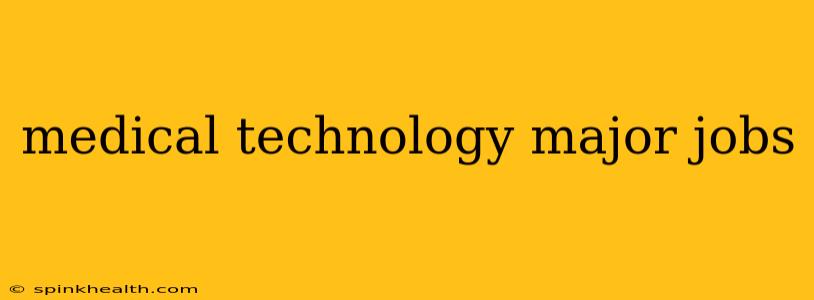Charting a Course in Medical Technology: Exploring Major Job Paths
The world of medical technology is booming, a dynamic field constantly evolving to improve healthcare. If you're passionate about innovation and improving lives, a career in medical technology offers a wealth of exciting opportunities. But with so many avenues to explore, choosing a path can feel overwhelming. This journey will explore some major job roles within the medical technology sector, answering common questions and highlighting the unique contributions of each.
What are some of the most in-demand jobs in medical technology?
This is a fantastic question, as the demand varies based on technological advancements and societal needs. However, some roles consistently remain highly sought after. Imagine this: you're a key player in a world where groundbreaking medical devices are constantly being developed and refined. That's the reality for professionals in roles like biomedical engineers, who design, test, and improve medical equipment; clinical research associates, essential in the clinical trial process, ensuring new technologies are safe and effective; and regulatory affairs specialists, navigating the complex landscape of FDA approvals and ensuring compliance. These are just a few examples – the field is brimming with potential. Other in-demand positions include medical sales representatives, who bridge the gap between manufacturers and healthcare providers, and healthcare informaticists, who manage and analyze the massive amounts of data generated by the healthcare industry.
What is the job outlook for medical technology careers?
The job outlook is exceptionally promising. The aging global population, coupled with advancements in medical technology, is fueling significant growth in this sector. The demand for skilled professionals is robust and expected to increase steadily in the coming years. This positive outlook is driven by several factors: the need for skilled professionals to develop, manufacture, and implement innovative medical devices and technologies; the expansion of healthcare systems globally, requiring more technical expertise; and the rising focus on preventative care and personalized medicine, further stimulating innovation and the creation of new roles.
What kind of education is needed for a career in medical technology?
The educational path varies depending on the specific role. Many positions require a bachelor's degree, often in biomedical engineering, electrical engineering, mechanical engineering, or a related field. However, advanced degrees (master's or Ph.D.) are becoming increasingly common, especially for research and development roles. For those interested in clinical research, a background in life sciences or a related field is often preferred. Regardless of the specific educational path, strong problem-solving skills, analytical thinking, and a passion for innovation are highly valued.
What are the salary expectations for medical technology jobs?
Salary expectations vary greatly depending on the specific role, experience level, location, and employer. However, in general, medical technology careers offer competitive salaries, often exceeding those in many other fields. Entry-level positions might start in a range depending on location and specialization, while experienced professionals in leadership positions can command significantly higher salaries. This compensation reflects the expertise, critical thinking skills, and significant impact these professionals have on healthcare delivery and patient outcomes.
How can I find medical technology jobs?
Networking is key. Attending industry conferences, joining professional organizations (like the Advanced Medical Technology Association (AdvaMed)), and participating in online forums can connect you with potential employers and mentors. Online job boards such as Indeed, LinkedIn, and specialized healthcare job sites are also excellent resources. Remember, tailoring your resume and cover letter to highlight relevant skills and experience for each specific position will significantly increase your chances of success.
The medical technology field offers a blend of science, technology, and humanitarian purpose. By understanding the various roles and career pathways, you can embark on a rewarding journey contributing to a healthier future. The road ahead might be challenging, but the impact you can make is truly significant.

